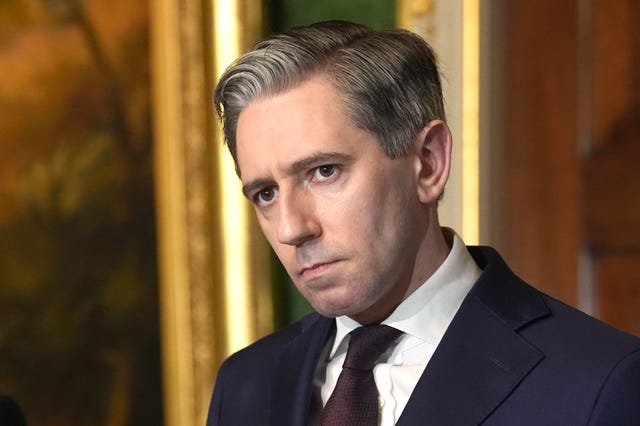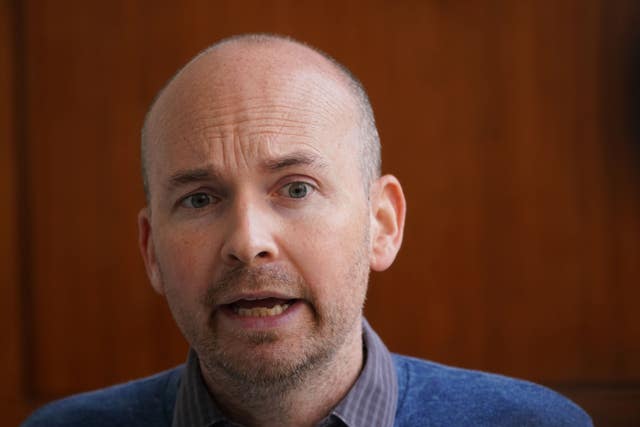A ‘robust’ probe is being carried out into claims that weapons were being flown through Irish skies unknown to the Irish authorities.
The Irish government has been accused of “false ignorance” on reports of flights carrying arms to be used in Gaza through Ireland.
Irish deputy premier Simon Harris was handed a folder of what he said were aircraft inventories by an opposition TD who said there was “no mystery” to the issue.
He said that a “robust” investigation was being carried out by the Department of Transport and added that any breach of Irish law “cannot be consequence free”.

News website The Ditch has reported that several flights carrying munitions to weapons manufacturers and contractors in Israel have travelled over Ireland.
Permission is needed from Ireland’s transport minister to carry munitions through Irish airspace.
Mr Harris, who is also the Foreign Affairs Minister, said last week that he did not believe weapons being used in Gaza were being flown through Irish skies based on the information available to him.
He admitted that it was “a real challenge” to know what is being carried in planes flying above Ireland.
On Thursday, People Before Profit TD Paul Murphy accused the Government of “false ignorance” and of “pretending you don’t know what’s going on”.
He produced a green folder of what he said were waybills that show “thousands of tons of weaponry have gone through Irish airspace on the way to be used in a genocide in Gaza”.
“This is not a mystery. The airlines admit it.”
He added: “You want to know my practical solution? My practical solution is that the Minister for Transport should prosecute the companies. It’s the law. They’re currently breaking the law.”

Mr Harris said that the Department of Transport is examining the reports and agreed that any breach of Irish law “cannot be consequence free”.
“Irish law matters, I’m very clear in relation to that, as is the Taoiseach, as is the Minister for Transport,” he told TDs.
“If there have been breaches of Irish sovereign law, decisions will need to be taken on the next steps, based on clear and robust evidence.
“I think we also need to be clear here, and I this is the point I was trying to make, that if you know existing legislation doesn’t provide for the implementation of a system of routine and random inspections, and rather, it requires that there first be an appearance of intention or likelihood for a civil aircraft to depart from a point in the state in a manner that will contravene the legislation, for example, carry munitions, I think it is a legitimate question for government to now consider whether we need to amend our own domestic legislation and whether more needs to happen internationally.
“So I’m very clear any breaches of Irish law, it cannot be consequence free, I agree with you. The Department of Transport is carrying out a robust examination of all of these matters and then will advise Government on what next steps are required.”
In response to questions from Social Democrats deputy leader Cian O’Callaghan, Mr Harris said that “no one is dragging their feet” and Ireland “is not standing idly by” on Palestine.
He said that he intends to call his EU counterparts in the hours ahead and see if they will “echo” Ireland’s call for the EU to review Israel’s obligation to adhere to human rights clauses in its trade association agreement, which the Netherlands had called for on Wednesday.
Mr Harris also said he had met senator Frances Black about her bill that would ban trade with illegal Israeli settlements on Palestinian lands.
Mr Harris and Irish premier Micheal Martin had initially committed to passing the Ms Black’s Occupied Territories Bill after it was amended to make it legally “robust”, but since then have suggested new legislation may be required.
Mr Harris said that there is “a narrow pathway” based on an advisory opinion from the International Courts of Justice, to legislate on banning trade, but Mr Harris said “we have not yet been able to identify the narrow pathway on services, that’s the truth”.
Campaigners have criticised the move to ban the trading of goods but not services, which is estimated to represent around 70% of trade activity.
“It’s not a policy position. It’s a legal position,” he said.
“There is a need to make sure any bill can withstand the inevitable challenge that this will face.”
He said his hope was that if Ireland brought forward such legislation that it may encourage other countries to do the same.
“If the EU refuses to act as a collective in relation to this, why don’t a number of member states do what we’re proposing to do here in Ireland,” he said.

